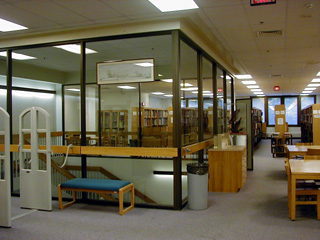*** As of July 21, the closing dates have been revised. See new dates on the schedule below. ***
As previously announced, the Physics, Chemistry, Biology and Mathematical Sciences libraries will close later this month. This article describes the redeployment of books and journals, the relocation of library staff, and the collection and services to be offered in a newly created Science, Engineering and Architecture Library.
New locations for science materials
Most older and lesser used materials will be moved into the new Library Depository, a closed-stack shelving and retrieval facility which opened in late June. Materials going to the Depository include books more than 13 years old that have not circulated in the past ten years and bound journals that are available in full-text electronically, such as titles available via Science Direct, American Chemical Society, Nature Online, and the American Physical Society. In addition, all journal volumes published before 1985 will be sent to the Depository.
Some materials will be moved to Paley Library including bound journal volumes published after 1984 and books published before 1997 that have been borrowed in the past ten years. All material currently housed in the Mathematical Sciences library will be moved to Paley Library.
The newest materials from the science libraries will be consolidated in the location previously occupied by the Engineering & Architecture Library, which will be reconstituted as a Science, Engineering and Architecture Library.
The Science, Engineering and Architecture Library (SEAL)
The new Science Engineering & Architecture Library will include current issues of print journals, a collection of reference materials and the most recent ten years of monographs in architecture, biology, chemistry, engineering, geology, physics and general science. Architecture bound journals will be held in SEAL. Services will include reference, course reserves, and library instructional services. We will also offer a slate of new online services such as Instant Messaging reference, new book lists, a SEAL blog site featuring new tools, resources, library events and news. Twenty-two computer workstations will be available and SEAL will offer expanded service hours seven days a week.

The Move
The transfer of materials to the Depository is already well underway in the Paley Library. Movers will start to work in the branch libraries in the later part of July. The Libraries will close the day before the movers arrive.
Scheduled dates of library closings, as of July 21st:
Physics Library, Tuesday, July 25 at 5pm
Chemistry Library, Friday, July 28 at 5pm
Biology Library, Friday, July 28 at 5pm (Previously August 1st)
Mathematical Sciences Library, Monday, July 31 at 4.30 pm (Previously August 3rd)
The Library catalog is updated daily as the move progresses to clearly indicate the new location of materials. Items relocated to the Depository may be requested using a form linked to each record in the catalog. Books will be delivered to Paley or SEAL within 24 hours and needed journal articles will be delivered via email. For more information about the new Library Depository, see the Temple Times article of April 27, 2006, the Library Blog article of June 21, 2006, and the Depository FAQ.
Staff
The library closures and other changes also mean changes for several of our staff. Joyce Dennis, Bibliographic Assistant (BA) in the Mathematical Sciences Library, has elected to take a position in the Collection Development Department in Paley Library. Joyce has a long history of library service at Temple, and already experienced an earlier transition when the library at TU-Center City was closed. Katerina Montaniel, currently in the Chemistry Library, will move to Access Services, as the BA with primary responsibility for the provision of services in the Library Depository.
Staff who will be located in SEAL include Gretchen Sneff, Head, SEAL Library, and librarian for engineering and architecture; Laura Lane, Science Librarian for physics, mathematics, geology and general science; Kathy Szigeti, Science Librarian for biology, chemistry, and computer science. Cathy Zabroski, Bibliographic Assistant currently in the Engineering & Architecture Library, will head circulation and supervise student workers in SEAL, and Marianne Sanville, BA currently in the Biology Library, will relocate to SEAL and oversee course reserves, collections and document delivery.
We hope that SEAL will become a popular gathering space for students in science, engineering and architecture. Having concentrated staff, services, and the most current books and journals across the sciences and engineering, SEAL will provide students and researchers the most current discipline-specific and cross-disciplinary information needed for study and research.
Please contact me with any questions or concerns.
Gretchen Sneff, 215-204-4724, gsneff@temple.edu
Head, Engineering & Science Libraries

